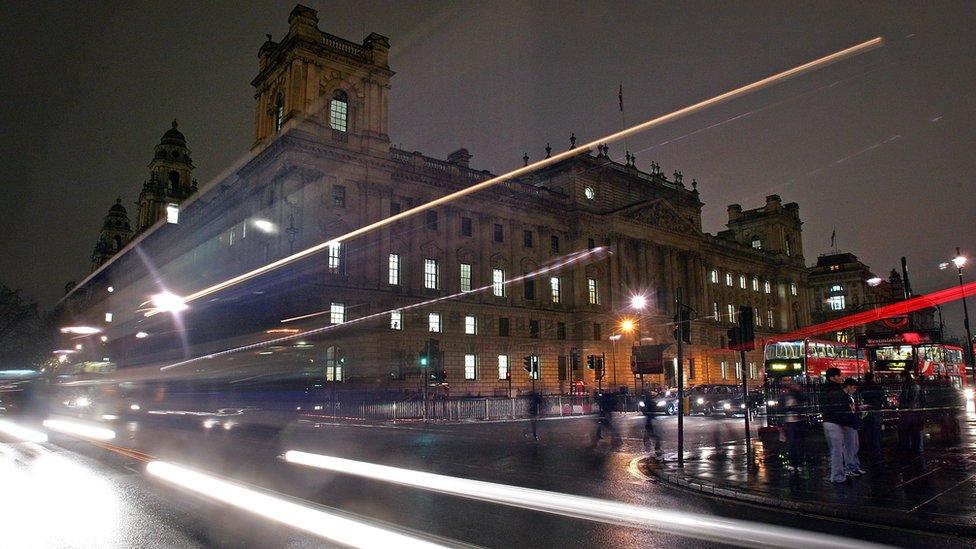HMRC still not doing enough to tackle tax fraud, say MPs
- Published

HM Revenue and Customs (HMRC) is still not doing enough to tackle tax fraud, a group of MPs has said.
Members of the Public Accounts Committee (PAC) said taxpayers were missing out on £16bn a year, as a result of evasion and criminal activity.
HMRC needed to increase the number of investigations, and prosecute more wealthy tax evaders, the MPs said.
But HMRC said it was one of the most effective tax collectors in the world.
And it revealed it had 26,000 staff focusing on tax evasion, avoidance and fraud, out of its total staff of 56,000.
'More prosecutions'
Labour MP Meg Hillier, the chair of the PAC, told BBC Radio 4's Today programme that HMRC "could clearly be doing more" with "the right resources".
"We have long felt that there should be more prosecutions because we think that sends a signal to the honest tax payer who is sweating over their tax returns and also a warning shot to those who are thinking about being fraudulent," she said.
Ms Hillier pointed out that over the last five years the level of tax losses - the difference between the tax that should be collected and the amount that is actually collected - had remained static at around 3% of all the tax owed to the Treasury.
She acknowledged the job of HMRC was "challenging" and welcomed international cooperation on tax evasion.

'Inadequate'
According to the report, HMRC had said it investigates around 35 wealthy individuals for tax evasion each year.
But it told the MPs that it did not know how many had been successfully prosecuted.
In addition, only one person was prosecuted after a former HSBC employee called Herve Falciani handed over a list of potential tax evaders with Swiss bank accounts in 2015.
The MPs said that created the impression that the rich can get away with tax fraud.
It follows a previous PAC report last November, in which the MPs said the number of prosecutions by HMRC was "woefully inadequate".
But as a result of extra funding given to it in the Summer 2015 budget, HMRC said it now hoped to investigate 100 companies and wealthy individuals each year by 2020.

How can 26,000 staff at HMRC be investigating just 35 wealthy people for evading tax?

Analysis: Simon Gompertz, Personal Finance Correspondent
Part of the answer may be that the richest and easiest pickings for tax sleuths lie elsewhere.
HMRC's estimate of the tax gap breaks down into £26bn not paid by businesses large and small, £6bn attributable to criminals, many operating in the black economy, and just under £3bn which individuals should have stumped up.
£3bn is a large sum of money, but it is the smallest category.
There is clearly a worry among tax officials about the cost of launching highly complex prosecutions and achieving disappointing returns.
The Falciani list of more than 3,000 possible tax evaders who hid funds in Switzerland resulted in 150 cases being looked at for potential prosecution, of which only 3 were passed to the Crown Prosecution Service to consider and, notoriously, only one was taken forward.
HMRC now names and shames deliberate tax defaulters by publishing a regular list of offenders.
But look at the characters on the list and you will see that they are small business people including restaurant owners, fishermen, newsagents and car traders, not the sort who have Swiss bank accounts.
Critics say that while this approach might be convenient for HMRC, it sends out entirely the wrong message, that they are keener to nab the small fry than to home in on the rich who might wriggle out of tax.

'Relentless'
The current tax gap is around £34bn a year - half of which is down to fraud.
But HMRC said it collected 93 pence of every pound due, making it one of the smallest tax gaps in the world.
"We remain relentless and strategic in tracking down the few that try to get out of paying their fair share," a spokesperson said.
Nevertheless the MPs said HMRC had not set out a clear strategy, and it should do so by November 2016.
Jon Thompson takes over as the new chief executive of HMRC this month, following the departure of the previous boss, Lin Homer.